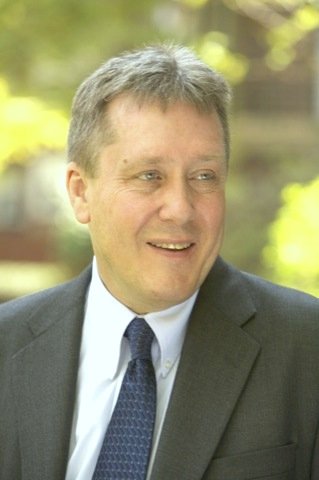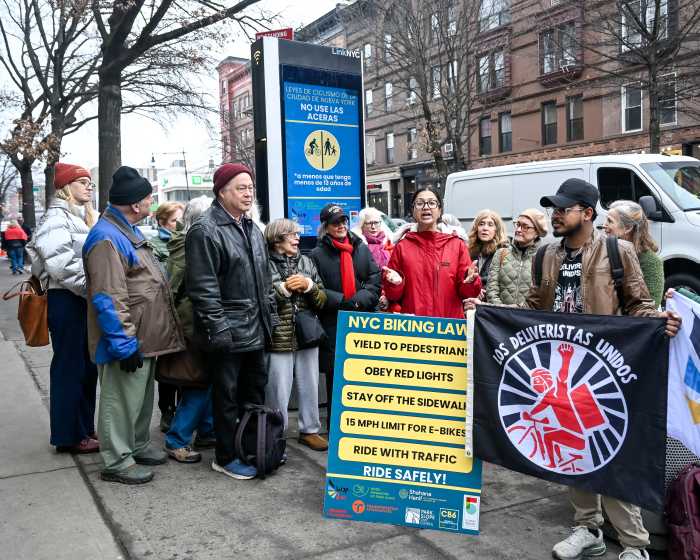Ocasio-Cortez Urges Patent Office To Deny Extension To Pharmaceutical Company

U.S. Rep. Alexandria Ocasio-Cortez (D-North-Central Queens, Eastern Bronx) and U.S. Sen. Senator Bernie Sanders (I-Vt) yesterday demanded that the U.S. Patent and Trademark Office (USPTO) deny a patent extension requested by Gilead Sciences for a lifesaving HIV medicine, worth tens of billions of dollars, due to the pharmaceutical giant’s “deceitful and immoral” behavior.
The lawmakers urge the government to instead allow the drug Descovy—used to both treat and prevent HIV—to be manufactured generically.
Ocasio-Cortez and Sanders are acting on explosive allegations that Gilead delayed the market entry of Descovy in order to continue profiting off a separate drug, Truvada, which Gilead knew to be less safe, until that drug’s patent term had been exhausted. “In the process of applying for patent extension” for the intentionally delayed drug, note Ocasio-Cortez and Sanders, “Gilead withheld information on its true motives” for halting Descovy’s development.
“Gilead has made an obscene $36 billion off of Truvada since 2004, even though thousands of Americans could have been spared injury and even death” had Descovy been used instead, wrote Ocasio-Cortez and Sanders in the December 6 letter to the USPTO. “Corporate misconduct must not be rewarded by the U.S. government through extending a government-granted monopoly on this medicine.”
Descovy, “if manufactured generically,” Sanders and Ocasio-Cortez maintain, “could quickly and affordably reach hundreds of thousands of Americans.” If the government extends Gilead’s patent, however, the corporation could use this monopoly to charge several thousand times more for the same compound, putting it out of reach for untold numbers of Americans desperate for affordable HIV treatment and prevention.
“We call on the USPTO to deny Gilead’s patent extension request and offer urgent relief to countless Americans confronting HIV who were denied this medicine for nearly a decade due to the greed of Gilead,” conclude Sanders and Ocasio-Cortez.
Dromm, Stavisky, Cruz host Tree Lighting in Elmhurst

City Council Member Daniel Dromm (D-Elmhurst, Jackson Heights), Assemblywoman Catalina Cruz (D-Corona, Elmhurst, Jackson Heights), and Minwen Yang from the office of State Sen. Toby Ann Stavisky (D-Central Queens) along with students from the Queens High School for Language Studies, PS 13, PS 102, PS 89 and members from several civic organizations gathered at Veterans Grove Playground in Elmhurst last Thursday for the neighborhood’s Fifth Annual Holiday Tree Lighting.
The event began with a color guard procession by Boy Scout Troop 17. Local resident Camila Noguera performed a stirring rendition of the United States national anthem. Local students and other attendees sang “Jingle Bell Rock,” “Let It Snow,” “Feliz Navidad” and other popular holiday carols. After the caroling, Dromm read the poem A Visit from St. Nicholas by Clement Clarke Moore, renowned author and Elmhurst resident whose family’s estate encompassed much of the neighborhood at the beginning of the 19th Century.
The poem was also read in Mandarin by Queens High School for Language Studies students. After the reading, attendees were treated to a performance by Evie the Elf. Dromm and Cruz then lit a Christmas tree that was decorated by local students. The end of the event saw a special appearance by Santa Claus himself.
“I am pleased to bring this Holiday Reading and Tree Lighting to the Elmhurst community once again,” said Dromm. “This special event gives local families the opportunity to celebrate the holidays in their own neighborhood. I thank Senator Stavisky, Assemblywoman Cruz, the Queens High School for Language Studies, PS 13, PS 102, PS 89, Community Board 4 Queens, Corona Ambulance, Corona Plaza Business Alliance, Elmhurst Supporters of Parks, the Newtown Civic Association, the Perna Foundation for Kids, the Queens Economic Development Corporation, the Elmhurst History and Cemeteries Preservation Society, and all the other participants for helping me establish this important local holiday tradition.”
Cuomo Signs Legislation Establishing Regulatory Framework Regarding Legalizing Hemp

Governor Andrew M. Cuomo yesterday signed legislation (S.6184/A.7680) establishing a regulatory framework for the production and sale of hemp and hemp extract in New York State.
The measure also requires the hemp industry to test and label their products, protecting consumers from potential harm. The legislation was signed pursuant to a chapter agreement, which provided for a more streamlined regulatory pathway for hemp products, granted the Department of Agriculture and Markets supervision over hemp growers and the Department of Health supervision over hemp extract; created a registration requirement for sellers of hemp extract products; made conforming regulatory changes to the 2018 Farm Bill; and defers decision making on hemp extracts, including CBD, as additives for food and beverages.
The Governor also announced that the state will host a hemp summit in January to further develop policies and priorities related to this burgeoning industry.
“The hemp industry in New York is exploding and with that growth comes a responsibility to regulate the industry in a way that helps ensure its long-term viability and protects consumers,” said Cuomo. “By establishing a regulatory framework for producing and selling hemp and hemp extract we can set the industry on a path to continued growth in a smart, safe way that empowers both farmers and consumers.”
New York State’s hemp program, including the hemp extract market, which sells popular products like CBD, has recently experienced significant growth. The growth of this industry, including more consumers using hemp extract products, has increased the need for a well-defined regulatory framework for producing and selling hemp extract as well as stronger protections for consumers. This measure helps achieve that goal by establishing a state permitting process for growers, processors and sellers of hemp and hemp extract as well as requires the laboratory testing and labeling of hemp extract products.
Gillibrand Calls For Senate Hearings For Complete Review Of Afghanistan Strategy

U.S. Senator Kirsten Gillibrand (D-NY), Ranking Member of the Senate Armed Services Personnel Subcommittee, yesterday called for a Senate hearing to investigate U.S. strategy and obstacles to success in Afghanistan.
Gillibrand’s call comes following the Washington Post’s release of previously confidential documents and interviews, in which senior U.S. military, administration, and diplomatic officials make clear that there was no clear objective to U.S. policy in Afghanistan, and no way of reaching stated goals, and that this was hidden from the American people.
“These papers show that past administrations, and our civilian and military leaders, have misled the American public about their objectives in Afghanistan and the potential of reaching those objectives. This is absolutely unacceptable,” said Gillibrand. “We have spent the last 18 years in Afghanistan, in what has become the longest armed conflict in U.S. history. It’s far past time that Congress reclaim its Constitutional role in our nation’s decisions to go to — and remain in — war. The men and women who serve our nation deserve much better, and the Senate must investigate how our nation got tangled in this mess.”
Gillibrand introduced legislation earlier this year to restore Congress’s role in the nation’s war powers. The War Powers Reform Resolution would repeal the 2001 and 2002 Authorizations for the Use of Military Force (AUMFs), which were passed to authorize military action, respectively, against September 11th terrorists hiding in Afghanistan and the perceived threat from Iraq.
Additionally, Gillibrand’s legislation would require the president to provide Congress with a clear objective for military action; evidence that the use of the United States’ armed forces is necessary, appropriate, and proportional to the mission; a finite list of adversaries; and the names of the countries where the U.S. military will deploy. If U.S. forces remain beyond two years without Congressional approval, Congress would not provide operational funding. This would require any administration to come to Congress with adequate time before the two years is over to pass a new AUMF, if necessary.








